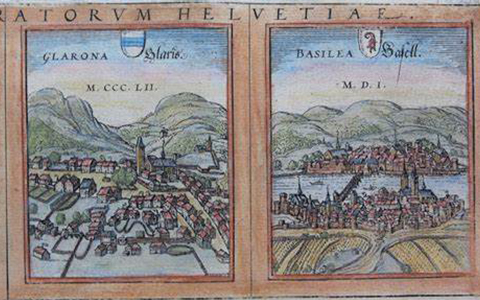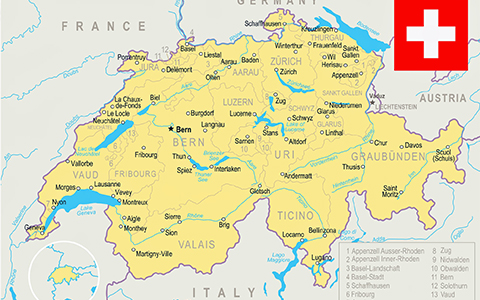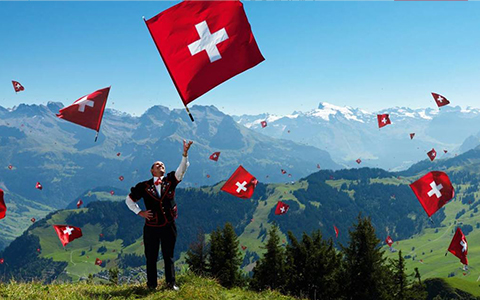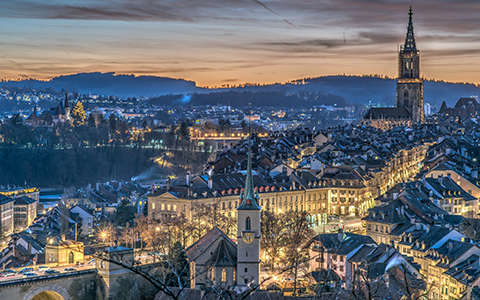
发布时间:2023-04-06
现代瑞士联邦成立175周年
2023年,现代瑞士迎来了它的175岁生日。旧联邦在1848年变成了一个联邦国家,并成为欧洲第一个民主国家。
瑞士的历史可以分为两个主要时期:1848年之前和之后。1848年之前,各州(即小国)之间的松散联盟形成了一个联邦国家。当时欧洲的政治体制主要还是君主制,在这一背景下,1848年的瑞士共和国作为欧洲的第一个民主国家似乎是一个绝对的例外。
为了对抗当时在欧洲占主导地位的哈布斯堡王朝,瑞士于1291年由各州组成联盟——“赫尔维蒂联邦”(Confoederatio Helvetica,瑞士的缩写CH即来源于此),直到1848年通过新宪法,形成了现在的国家。

1848年以前的瑞士,内部冲突时有发生。但自19世纪中叶以来,位于26个州的3000多个公社组成了联邦,瑞士通过稳定的内部组织,享有了相对的内部和平。所有公民都可以参与各级政治,并定期在全民公投和立法动议中表达自己的意愿。由此,所有的瑞士人都能直接在国家和社区层面做出许多政治决定。这种民众参与产生了两个显而易见的效果:按照欧洲标准,瑞士的税往往很低,因为选民可以对各类财政支出进行审批。而政治决策往往很缓慢,因为每一步都必须考虑不同人之间相互冲突的个人需求和意见。

瑞士的这种联邦制和直接民主的组合在世界上是独一无二的,它被视为该国在政治和经济上取得成功的关键。的确,瑞士是一个重要的、受到高度重视的经济大国,这要归功于其悠久的金融服务传统和高质量、专业化的产品制造,如精密手表、光学仪器、化工品和药品,以及艾曼塔尔(Emmental)奶酪、牛奶巧克力等特色食品。至关重要的一点是,瑞士能通过高效的国内和国际银行网络提供必要的融资。瑞士经常被称为“创新之国”。在化工制药领域,包括诺华(Novartis)、科莱恩(Clariant)和罗氏控股(Roche Holdings)等公司(总部均设在巴塞尔),就是体现瑞士竞争力的很好的例子。与许多瑞士产业一样,化工制药业在研发上投入了大量资金。许多公司都与瑞士的著名大学以及苏黎世和洛桑的联邦技术研究所进行合作。 此外,瑞士还被列为世界上生活水平最高的国家之一。

伯尔尼是一个面积不大但高效的首府,其名字(Bern)源于该州中世纪统治者用作纹章图案的熊,熊公园(bear pits)现在是该市人气很高的动物园。苏黎世是迄今为止全国最大和最国际化的城市,其著名的班霍夫大街(Bahnhofstrasse)可与世界上其他主要城市的购物区相媲美。巴塞尔(全球制药中心)和卢塞恩(Lucerne)是重要的德语城市,日内瓦和洛桑是瑞士法语区的中心,许多国际性的政治、文化和体育机构的总部都位于此,贝林佐纳(Bellinzona)和卢加诺(Lugano)则是意大利语区提契诺州(Ticino)最重要的城市。

因此,1848年明显标志着瑞士历史上的一个质的飞跃和一个新阶段的开始,而这个高品质的阶段一直延续至今。瑞士地处欧洲的中心,175年来社会发展始终如一,在长期保持中立基础上,形成了稳定的经济和教育,以及独特的品质生活和美好的前景——这种现象在欧洲历史上是无可比拟的。
175 years of modern Switzerland
In 2023, modern Switzerland celebrates its 175th birthday. The old Confederation becomes a federal state in 1848 and the first democracy in Europe
The history of Switzerland can be divided into two major periods: before 1848 and after. At that time, the loose union of cantons, i.e. small states, became a federal state. Against the backdrop of the monarchies that shaped the political face of Europe at that time, the Swiss Republic of 1848 seemed to be an absolute exception as the first democracy in Europe.
Switzerland was formed in 1291 by an alliance of cantons against Europe’s dominant Habsburg dynasty—the “Confoederatio Helvetica” (or Swiss Confederation from which the abbreviation CH for Switzerland derives) until 1848, when a new constitution was adopted and the present nation was formed.
Before 1848, internal conflicts were not uncommon, but since the mid-19th century, Switzerland has enjoyed relative internal peace, through a stable internal organisation: it is a federation of more than 3,000 communes located in 26 cantons. All citizens can participate in politics at all levels and regularly express their will in referendums and initiatives. In this way, all Swiss people make many political decisions directly at national and communal level. Two effects of this popular participation are obvious: taxes in Switzerland tend to be low by European standards because voters can review and approve a wide range of expenditures, and political decision-making tends to be slow because competing individual demands and opinions must be considered at every step.
The Swiss mix of federalism and direct democracy is unique in the world and is considered central to the country's political and economic success. Indeed, Switzerland is a significant and highly valued economic power, thanks to its long tradition of financial services and high-quality, specialised manufacturing of products such as precision watches, optics, chemicals and pharmaceuticals, as well as food specialities such as Emmental cheese and milk chocolate. Above all Switzerland offers the necessary financing through an efficient national and international banking network. Switzerland is regularly listed as the "country of innovations". The chemical-pharmaceutical industry, including companies such as Novartis, Clariant, and Roche Holdings (all headquartered in Basel), is a good example of Swiss competitiveness. Like many Swiss industries, the chemical-pharmaceutical industry spends large sums on research and development. A number of firms collaborate with the country’s famous universities and with the Federal Institutes of Technology in Zürich and Lausanne. In addition, Switzerland is ranked as one of the countries with the highest living standard in the world.
Bern is a small but efficient capital whose name derives from the bear that the canton's medieval rulers used as a heraldic symbol; the bear pits are now part of the city's popular zoo. Zurich is by far the largest and most cosmopolitan city in the country, with its famous Bahnhofstrasse rivalling the shopping districts of other leading cities in the world. Basel (global pharma hub) and Lucerne are important German-speaking cities, Geneva and Lausanne are the centres of the country's French-speaking cantons heading many international political, cultural and sports institutions, and Bellinzona and Lugano are the most important cities in Italian-speaking Ticino.
Therefore, the year 1848 clearly marked the beginning of a qualitatively new stage in Swiss history that has continued until today. A consistent social development for 175 years in the heart of Europe, building on the neutrality that continues to this day, providing economic and educational stability and a unique quality of life and amazing perspectives - there are no analogies to this phenomenon in the history of Europe.
本文转载自瑞士雷梭勒家族办公室,如有侵权,敬请告知删除。
Sooswiss为您提供
瑞士方向私人管家式的定制服务:
1)家族传承 2)财富管理 3)投资咨询
4)企业服务 5)居留计划 6)国际教育
更多资讯请登录网站 www.sooswiss.com
